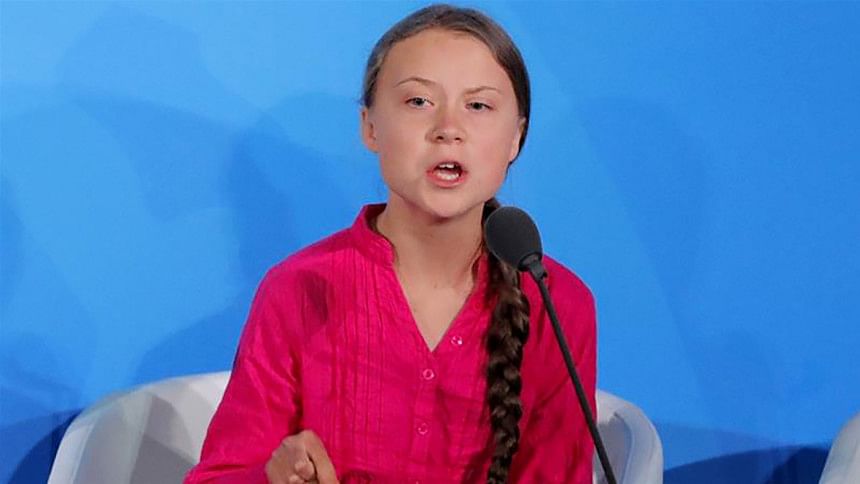The looming climate crisis: Where is our Greta Thunberg?

The level of change in the climate that humans have already caused can no longer be labelled an innocuous "climate change" but rather a pernicious "climate crisis". This new reckoning is bound to cause major setbacks in countries like ours and should surely cause major headaches to socio-economic planners.
Bangladesh sits at the head of the funnel that directs all the atmospheric turbulence above the Indian Ocean to the narrow mouth of the Bay of Bengal, putting us at the receiving end of this huge climate crisis. But do we see anyone blowing the whistles on this one? The government seems complacent with the high growth rates the nation has achieved in recent years but all such growth prospects will be in serious jeopardy if we fail to address the climate crisis on a war footing.
15-year old Swedish climate activist Greta Thunberg stunned the world leaders last week at the UN General Assembly with her in-your-face proclamations on how climate change, nay, climate crisis, has robbed our children of their right to a prosperous future in a world sinking in its oceans and churning in its storms. That the world must rise in a body to counter the effects of anthropogenic global warming and arrest the rising global temperatures and devote resources to "carbon sequestering" is causing world leaders to cringe in their seats. Many world leaders are taking bold steps and major economic measures to counter climate change and many more are rising to the challenge being prodded by a fearless teenager from Sweden who dared to cross the Atlantic in a solar powered boat instead of taking a carbon-gushing plane ride to attend the UNGA meeting in New York. IPCC (Intergovernmental Panel on Climate Change)—the global compact of climate Tsars—has been working on creating awareness and pushing for remedial actions on climate change for nearly three decades now but the world needed the prodding of a sharp-tongued and fiercely committed Greta Thunberg to jolt world leaders into fervent action on the impending climate crisis.
Bangladesh is a poster-child for climate change that brings to fore all the disastrously harmful effects of global warming; in all climate conferences Bangladesh is at the dead centre of discussions on how to mitigate the effects of and adapt to climate change but not much planning and activity is visible yet on the home front. Rather we had been in the news for all the wrong reasons, when Green Climate Fund resources were plundered by a government-sanctioned private bank that almost went belly up last year.
Sweden is a country with a large coastline where the effects of global warming is causing rapidly changing shorelines as the sea creeps inward relentlessly. Of course, Sweden has reasons to be highly concerned but it is a thinly-populated country with a high per capita income. It has the wherewithal and landmass to put up with climate change. That this nation of only 10 million has produced a Greta Thunberg to ring the carillon bell on climate change makes our lack of action in this area all the more poignant.
Bangladesh may not have as large a coastline as Sweden but our fragile coastline hosting the largest mangrove forest of the world and a population 17 times larger than Sweden's at the mercy of the elements make it imperative that someone as fearless and as passionate as Greta comes forward to bell the cat on climate crisis before we become climate fodder. There is certainly no dearth of derring-do teenagers here as evidenced by the traffic revolt of the teens earlier this year. The clock is ticking for a climate uprising. Is anyone listening?
Habibullah N Karim is an author, policy activist, investor and serial entrepreneur. He is a founder and former president of BASIS and founder-CEO of
Technohaven Company Ltd. Email: [email protected]

 For all latest news, follow The Daily Star's Google News channel.
For all latest news, follow The Daily Star's Google News channel. 



Comments